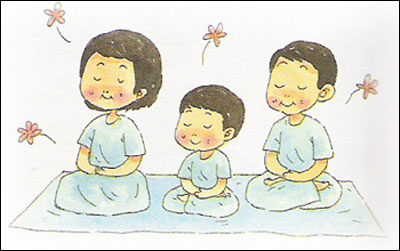Meditation
Meditation for Peace
Raising Children to Be Smart and Virtuous#3
Parents must set a good example for their children to see.
Raising a Child to Show Care towards Others
For children that demonstrate care towards others, they must be taught to take care of themselves. Then, they will be capable of helping others. Then, they will be capable of helping others. To achieve this, parent must train children to have endurance.
At first glance, if seems like it is enough for children to be wholesome and smart, but the truth is, it is not enough. When one is born as a human being, one must bring benefit to others as well.
Let’s suppose that we plant a fruit tree. We care for it by watering it, and plowing and fertilizing soil. Ten years pass and it still bears no fruit, so we decide to cut it down.
In comparison, if children do not assist others, no one will want to help them when they are adults. Life will be difficult for them and they will be poor throughout lire. When they need help no one will want to help them, because they are careless towards others.
Parents can teach their children to have care for others by teaching them to help themselves by having endurance at four levels:
1) Endurance towards physical hardship. Children will learn to work hard and not be afraid of hard work and physical hardship.
2) Endurance towards pain suffering. Children will be aware of the need to care for their own health. They will not be deceptive and will never pretend to be sick to get out of school.
3) Endurance towards conflict. Children will learn to be a team player. They will not have an inferiority or a superiority complex. They will not consider themselves equal to adults. They will know their place when interacting with others.
4) Endurance towards the stimulants of defilements (kilesa). Children will not become slaves to alcohol and drugs, sexual attraction, money, praise and other problems. These stimulants cause major social problems.
For example, corruption finds its roots in parents who didn’t teach their children to endure stimulants of defilements. They didn’t instill truthful adages such as, honesty will always fulfill, dishonesty will only fulfill for a short period. In addition, they encouraged their children to worship money even though money can’t bur everything, i.e. purity of the mind.
When children are taught to choose money over virtue, they grow up to care for nothing but money. It does not matter if they obtained it through corrupt or deceptive means. This hindrance has prevented a nation like Thailand from progressing, even thought it has more natural resources than many other countries.
Parents must find good books for them to read.
How Virtues can translate into Intelligence for Children
After reading the book, “How to Raise the Children to Be Good People for the Nation,” one can understand how virtues can lead to intelligence in children.
All children want to be good. Children can be compared to white sheets and their parents are the ones who dye the sheets. If they select the right color and apply the right techniques, then the sheets will be beautiful. But if the sheets are not dyed correctly, they could be considered damaged, useless, and then thrown away. Raising children to be intelligent is much more complicated than the dying of sheets. Mistakes are very difficult to rectify.
People who surround children must set the best example for them:
1. Parents must set a good example for their children to see.
2. Parents must find wholesome friends for them.
3. Parents must find good books for them to read.
4. Parents must bring them to a good teacher.
These people can be fine examples for children in these areas:
1. Proper approach to work.
2. Proper approach to time management.
3. Proper approach to using the four requisites.
They can set an example in these areas because they have these special characteristics:
1) Ability to maintain quality.
A person that maintains quality tries his best to deliver the best results in everything he does. He has a clear understanding of what constitutes high quality and how it can be achieved. When he works, it is to his fullest ability. He is aware of obstacles and problems, and can prevent them.
A person who has no respect for education, other people, or looks for fault in others, will not be able to attain this level of wisdom. No one will want to share anything with him.
However, if children learn about respect at home, and see good examples set by those around them, they will learn to value respect. They will learn what high quality is, a proper approach to work, and will be able to see potential problems. They will be very capable and effective at their work in the same way their role models are.
2) Ability to manage time.
A person who manages his time can lay out a plan for his work. Regardless of the work, he can see all its steps, what should be done first, what should follow, how long each step will take, and how long the entire project will take.
If a person has never taught himself time management, he would not be able to complete the tasks. Those who can manage time know its value. When time passes, it never returns. And good opportunities pass, leaving old age in its place.
Those who cannot manage their time will have habits of doing things to their liking. They will be uncomfortable when given deadlines. Without discipline to manage their time, it will be difficult to complete anything planed.
People who can manage their time have taught and disciplined themselves beforehand. They learned how much time is needed in a basic routine or for a project. They can implement a plan according to a step-by –step process, calculating the required time for accurate completion, and are rarely ever wrong.
Thus, when children receive training in discipline from home and see examples of people who are capable of effective time management, they will become people who appreciate the value of discipline and time management. This is a way to instill a habit of selflessness. And they will be able to follow in the footsteps of their role models.
3) Ability to manage a budget.
A person who can manage a budget is able to plan best for expenditures to yield the highest return with minimal resources.
A person who manages a budget must know what is necessary and what is not. He must not be wasteful with it. This person must first assess if an expense will benefit the group. He knows that a tight budget will lead to lower quality and over budgeting will lead to wastefulness. He must be honest; corruption for his own or his friends’ benefit must not occur.
Organizations that lack people who can manage a budget will have financial problems because of unclear and confusing financial plans. this will bring project setbacks, loss of trust among employees, and eventually a bad reputation.
A person effectively manages a budget because he was taught to endure physical hardship, pain and suffering, conflict, and the stimulants of defilements. With this endurance, he knows to be frugal in his use of the four requisites.
By having endurance and appropriate role models, children will become intelligent with regard to budgets and will follow the footsteps of their role models in the best possible way.
Children can absorb these three characteristics from the good people around them. They will learn skills in quality, time, and budget management. They will effectively complete any assigned projects, using minimal time and resources, which is a great asset in any environment. This is how virtue translates into intelligence; it is through the examples set by people around them.
Stay abreast of new information that would assist in their upbringing.
Conclusion
Parents must pass on knowledge, ability and virtues to their children until the children develop intelligence and virtue that will guide them to lead their lives beautifully and proudly. For parents to successfully pass these qualities to their children, they must;
1) Stay abreast of new information that would assist in their upbringing. They will understand how children develop in modern society and the challenges they face.
2) Keep their children from immorality. Parents must make time to teach their children, to teach them how to use the four requisites, complete their chores, and go about their daily routine. They must also ask teachers, senior relatives, and friends to keep an eye on them, and give them permission to warn their children when they do something wrong.
If parents can do these two things, then children will become accustomed to wholesomeness rather than unwholesomeness. Children will always be surrounded by those who can show them right thought, speech, and action. They will grow up to be smart and virtuous. These two qualities will enable them to rely on themselves and live their lives beautifully.
Meditation - Related Articles
"> ">
">








